Tamilnadu State Board New Syllabus Samacheer Kalvi 9th English Guide Pdf Prose Chapter 4 Seventeen Oranges Text Book Back Questions and Answers, Summary, Notes.
Tamilnadu Samacheer Kalvi 9th English Solutions Prose Chapter 4 Seventeen Oranges
9th English Guide Seventeen Oranges InText Questions and Answers
Question 1.
Where did the narrator work?
Answer:
The narrator worked in Swift Delivery Company.
![]()
Question 2.
What was the narrator’s job in the docks?
Answer:
The narrator went in and out of the docks to carry and deliver the goods.
Question 3.
What was Clem Jones carrying in the box?
Answer:
Clem Jones was carrying a ship’s cat in the box.
![]()
Question 4.
What happened when the box was opened?
Answer:
When the box was opened a ship’s cat jumped out and ran back into the docks.
Question 5.
Did the narrator believe Clem’s story?
Answer:
No, the narrator did not believe Clem’s story because he knew that Clem was planning for a theft.
![]()
Question 6.
What was the narrator carrying in his pockets?
Answer:
The narrator was carrying oranges in his pockets.
Question 7.
Who is Pongo?
Answer:
Pongo is a policeman.
![]()
Question 8.
Why did Pongo want to bring another policeman?
Answer:
Pongo wanted a witness against the narrator when he brought up the case in the court. So he brought another policeman.
Question 9.
What did the voice in the narrator’s head tell him to do?
Answer:
The voice in the narrator’s head asked him to eat all the oranges so that there will be no evidence of his theft.
![]()
Question 10.
Why did the policemen arrive a little late to the cabin?
Answer:
The policemen had seen some carts at the gate. They went and talked to the drivers. So they arrived a little late to the cabin.
Question 11.
What did the narrator do with the pips and peels?
Answer:
The narrator swallowed the pips and peels too.
9th English Guide Seventeen Oranges TextBook Questions and Answers
A. From your reading of the text, choose the correct answers from the options given below.
Question 1.
The narrator was very fond of …………………
(a) eating oranges
(b) driving a pony-and-cart
(c) reading detective stories
(d) munching away at something
Answer:
(a) eating oranges
![]()
Question 2.
The narrator was searched by the policeman, because ………………….
(a) his pockets were bulging
(b) he was singing songs
(c) he was carrying a box
(d) the oranges could be smelt
Answer:
(a) his pockets were bulging
Question 3.
The narrator kept his mouth shut when questioned by Pongo, because ………………….
(a) anything said would be held as evidence against him.
(b) the oranges would fall out
(c) he did not steal the oranges
(d) he was scared of Pongo
Answer:
(a) anything said would be held as evidence against him.
![]()
Question 4.
The voice in the narrator’s head advised him to ………………….
(a) confess the truth to Pongo
(b) eat all the oranges
(c) deny his guilt
(d) hide all the oranges
Answer:
(b) eat all the oranges
Question 5.
Pongo found no trace of the oranges on the table, because …………………
(a) Pongo’s mate had stolen them
(b) all the oranges were sold
(c) the narrator had eaten them all
(d) they disappeared mysteriously
Answer:
(d) they disappeared mysteriously
B. Answer the following questions briefly in one or two sentences.
Question 1.
Why did the narrator call Clem Jones a careful planner?
Answer:
Clem Jones planned a theft carefully and executed it well.
![]()
Question 2.
What was Clem Jones carrying in the box during his second attempt?
Answer:
During the second attempt, Clem Jones was carrying a large Dutch cheese in the box.
Question 3.
Why did the policeman suspect the narrator?
Answer:
The policeman caught the narrator red-handed because the string of the narrator’s apron broke and the cop noticed that the narrator’s pockets were bulging.
![]()
Question 4.
What did Pongo consider as evidence against the narrator?
Answer:
Pongo considered the oranges to be evidence against the narrator.
Question 5.
How did the narrator feel when he was alone in Pongo’s cabin?
Answer:
When the narrator was locked in the cabin, he lost hope in life and felt afraid that he would lose his job.
![]()
Question 6.
What did the narrator do to get rid of the evidence?
Answer:
The narrator swallowed the pips and peels of the oranges beside the fruits to get rid of the evidence.
Question 7.
What did Pongo do when he found no oranges on the table?
Answer:
Pongo looked everywhere for the oranges. He looked in the narrator’s pockets and in his apron. He became angry and shouted at the narrator.
![]()
Question 8.
Why were the policemen not able to bring any charges against the narrator?
Answer:
As there was no evidence, the policemen could not bring any charges against the narrator.
Question 9.
How did the narrator feel after eating seventeen oranges?
Answer:
The narrator felt sick for a week and the oranges kept working away in his stomach.
![]()
Question 10.
What happened to the narrator’s love for oranges after the incident?
Answer:
The oranges worked away in the narrator’s stomach. He lost his love for oranges after the incident.
Additional Questions and Answers
Question 1.
What made the narrator be quiet when pongo enquired him?
Answer:
The narrator’s fear made him be quiet for Pongo’s enquiry.
Question 2.
Where did Pongo lock the narrator?
Answer:
Pongo locked the narrator in the cabin.
![]()
Question 3.
Where did Pongo go, after locking the narrator in the cabin?
Answer:
Pongo went to bring another policeman to be a witness to the narrator’s case.
Question 4.
How did the narrator get the idea of eating all the oranges?
Answer:
The voice in the narrator’s head told him to eat the oranges and to destroy the evidence.
![]()
Question 5.
Did the voice tell him anything else?
Answer:
Yes, the voice told him to eat the pips and peels (seeds and skins) of the oranges.
Question 6.
Why did the voice tell him to eat the seeds and peels?
Answer:
The voice told him to do so in order to leave no evidence for the theft.
![]()
Question 7.
How did the narrator eat the pips and peels?
Answer:
The narrator swallowed the pips and peels.
Question 8.
Why did the narrator swallow everything?
Answer:
The narrator swallowed everything as the time was running out.
![]()
Question 9.
How did the narrator eat the remaining oranges after the first one?
Answer:
After the first one, the narrator cut the oranges into large chunks. He swallowed the pieces one after the other.
Question 10.
When did the narrator’s love for the orange vanish?
Answer:
The editor had to finish off all the oranges in order to destroy the evidence. Fie felt bad and fell sick upsetting his stomach. Thus his love for oranges vanished.
C. Answer the following in about 80 – 100 words.
Question 1.
Narrate the clever strategy followed by Clem Jones to deceive Pongo.
Answer:
Clem Jones was one of the narrator’s friends who worked with him at the dock. Clem was amazingly smart about stealing things from the docks and boats that he easily fooled the policemen with his great cunningness. Once, he carried a box and came out of the docks. The cop Pongo stopped him and investigated the box. Clem told that it had a cat. The cop insisted on opening it.
When Clem did so, a ship’s cat jumped off and escaped into the docks. When Clem Jones returned with the box of cheese, he looked angrily at the policeman Pongo to make the policeman feel guilty of his previous act of opening the box, in which the cat was kept inside. By making Pongo feel guilty, Clem was able to avoid any more security checks and thus was able to steal a large Dutch Cheese.
(OR)
There are expect thieves who plan it carefully. Clem was a good planner of theft. One day, while Clem was coming out of the docks with a box, Pongo stopped him. Fie asked him to open the box. She told Pongo that the cat would run away. Pongo did not believe him. So he made Clem open the box.
Suddenly the cat jumped up and ran away. It was a ship’s cat. Clem ran after it shouting angrily. After two minutes, he came back with the same box. She held the lid down tightly. Pongo laughed at him but Clem looked at him angrily. He looked angry all the way home. Then he smiled. He opened the box and took out a large Dutch cheese.
“A clever fox can even deceive a dog”
![]()
Question 2.
Describe the confrontation between the narrator and Fongo.
Answer:
Title: Seventeen Oranges
Author: Bill Naughton
Characters: Narrator, Pongo, and another policeman.
Theme: “Too much of anything is good for nothing”
The narrator used to work in the docks, carrying cargo from the docks. He had an irresistible love for oranges. He stole them, from the boats and ships and chew them for hours.
However one day he was caught by Pongo, the policeman. He wanted to make the narrator’s case an example for all the other workers and frighten them off the consequences of dishonesty and stealing.
The police officer locked him in a cabin and went out to bring another police officer to be a witness. The narrator ate up the seventeen oranges with their pips and peels. He damaged all the evidence against him. That was a very bitter experience for him. The policemen could not do anything against him. The narrator was never crazy about oranges anymore.
“Look before you leap”
Paragraph for Slow Learners
The narrator had a great love for oranges. He could eat oranges all day and every day. He worked in the shipyard. His irresistible love for oranges tempted him to steal the oranges from the boats and ships. One day Pongo, the policeman caught him. He had oranges in his pockets. Pongo wanted to make a case in order to frighten the other workers also.
He locked the narrator in a cabin. He went out to get another policeman as a witness. The narrator decided to damage the evidence. He ate all the oranges with the pips and peels. It was a bitter experience for him. The policemen could not do anything. They had to let him free. The narrator was never crazy about oranges thereafter.
“Covet all, Lose all”
Vocabulary:
D. Find the synonyms for the underlined words given in the passage.
Question 1.
The voice in his head asked the narrator to eat the evidence.
(a) proof
(b) contradict
(c) disprove
(d) refute
Answer:
(a) proof
![]()
Question 2.
Clem looked at Pongo furiously.
(a) politely
(b) gently
(c) angrily
(d) calmly
Answer:
(c) angrily
Question 3.
When Pongo caught the narrator with the oranges, he was very frightened.
(a) undaunted
(b) afraid
(c) valiant
(d) brave
Answer:
(b) afraid
![]()
Question 4.
The narrator was quiet when Pongo questioned him.
(a) calm
(b) noisy
(c) silent
(d) agitated
Answer:
(c) silent
Question 5.
The narrator was in trouble because he took the oranges.
(a) peace
(b) difficulty
(c) harmony
(d) comfort
Answer:
(b) difficulty
E. Find the antonyms for the underlined words in the following sentences.
Question 1.
Seventeen oranges were hidden in the narrator’s pockets.
(a) exposed
(b) masked
(c) concealed
(d) buried
Answer:
(a) exposed
![]()
Question 2.
Clem Jones was ordered to open the box.
(a) prepared
(b) arranged
(c) forced
(d) requested
Answer:
(d) requested
Question 3.
Pongo locked the narrator inside the cabin.
(a) closed
(b) sealed
(c) released
(d) chocked
Answer:
(c) released
![]()
Question 4.
Pongo carefully searched the narrator’s pockets.
(a) attentively
(b) carelessly
(c) cautiously
(d) strictly
Answer:
(b) carelessly
Question 5.
The narrator of the story felt very sick for a week
(a) healthy
(b) disordered
(c) feeble
(d) unhealthy
Answer:
(a) healthy
Listening:
F. Complete the table with suitable responses.

Answer:

G. Answer the following questions based on your listening.
Question 1.
Why did Chatur Pandit ask the king for 1000 gold coins?
Answer:
Chatur Pandit said that he had spent 1000 gold coins to catch the red peacock.
![]()
Question 2.
Where did Chatur Pandit find the ‘red peacock’?
Answer:
According to Chatur Pandit, he found the peacock in the jungle.
Question 3.
What sort of person was Chatur Pandit?
Answer:
He was a greedy minister.
![]()
Question 4.
State whether the statement is True or False.
Answer:
Tenali was given three weeks to bring more red peacocks. This statement is ‘False’.
Question 5.
Why did the people feel that they were lucky to have Krishna Deva Raya as their king?
Answer:
The people felt that they were lucky to have a king who would not afraid to admit his mistake.
Speaking:
H. Work in groups of four. Choose one of the situations given below. Discuss how the story would have been different if,
Question 1.
Pongo had pardoned the narrator after scolding him.
Answer:
The narrator was not a thief. He was in the habit of stealing something whenever he left the docks. He used to hide them under his apron. One day, there was a banana boat in the docks. He picked up the bananas which fell off the boat and quickly hid them under his apron.
But the bananas were not his craze. He loved to eat oranges very much. When he came out from the docks with the oranges hidden in his pockets. Pongo, the policeman caught him. The pockets were bulging as the apron string was broken. There were seventeen oranges. A lot of people were stealing from the docks.
The narrator kept quiet and was frightened. Pongo found him very innocent. He sympathised with the narrator. He did not want any action to be taken against him. He was a kind man. He advised the narrator very politely not to steal anymore. Pongo pardoned the narrator. The narrator thanked the policeman and went home happily.
![]()
Question 2.
Pongo had arrived on the scene before the last orange was eaten.
Answer:
The narrator was got red-handed when he came out from the docks. As his apron string was broken, the policeman, Pongo could find out his bulging pockets. The seventeen oranges in his pockets. Pongo caught him for his theft and locked him in a cabin. He kept the narrator in the cabin, he went out to bring another policeman to be a witness to the case.
The narrator was fear-stricken. A voice from the narrator’s head told him to eat away all the oranges. It forced him to eat the seeds and the peels. The narrator had to eat them to destroy the evidence. He ate the oranges quickly. But only one orange was left. At that time, the policemen had come near the cabin.
The narrator heard the sound of their arrival. They opened the cabin and found only one orange left on the table. They understood the narrator’s attempt to destroy the evidence. They seized the last orange and warned him of his criminal act of destroying the evidence. Both of them decided to produce the narrator before the court to get him punished, thereby teaching a lesson to others.
![]()
Question 3.
Pongo had forgotten to lock the door properly but the narrator only discovered it just before pongo returned.
Answer:
The narrator was a lover of oranges. He liked to eat oranges one after the other all day and everyday. In fact, he was not a thief. But he used to steal something whenever he left the docks. He had put the oranges in his pockets and came out. Pongo, the policeman noticed his bulging pockets as his apron string was broken.
The narrator was calm and he did not say anything. Pongo locked him in a cabin. Pongo went out to bring another policeman to be a witness to take up the case to the court. The narrator was in the cabin. He looked at the walls. He was afraid that he would lose his job and be imprisoned. The policemen were returning to the cabin. Before their arrival, the narrator was surprised to notice the cabin unlocked.
The narrator had enough chance to escape from the cabin. But the narrator did not attempt to go out. He remained in the cabin, till Pongo’s arrival. On return, Pongo found the narrator unmoved despite the door was not locked. Pongo and the other policeman remained to dumbfound. They bowed before the narrator for his honesty and discipline. They released him at once. The narrator thanked them heartily and went back hope peacefully.
Writing:
I. Work in groups and discuss. Then write a diary entry in about 60-80 words describing your feelings and emotions for the given situations. Imagine, you are Pongo.
Question 1.
Your feelings when you caught the boy?
Answer:
I am pongo, the policeman. I work as the security guard in the shipyard. One day I was on duty. I saw a boy riding a cart and coming out of the docks. His pockets were bulging. He had hidden them under his apron. As usual I stopped him for a casual check. I found seventeen oranges hidden in his pocket.
But he was not a thief. However he had stolen the oranges and taken them home. He kept quiet. He could speak nothing. He was very scared. He was only a teenager and crazy of oranges. So I took pity on him. I had no intention to punish him. I let him go after counselling him. It was quiet obvious that he was free from fear and worry. I just went ahead on my duty with the spirit of gentleness and forgiveness.
![]()
Question 2.
Your feelings and emotions when you came back and found oranges gone?
Answer:
I never thought that I would get a case that day. It was quiet unfortunate that I caught a boy red-handed with seventeen oranges. This occured in the shipyard. Wishing to warn other people against stealing, 1 decided to take action against this boy. I locked him in a cabin. He was frightened and upset.
He thought that he would lose his job and be imprisoned. I went out to bring another policeman to be a witness against the boy. The policeman and I returned to the cabin. We entered the cabin and found that the oranges were finished off. The oranges were the only evidence we had. Now there was no evidence to punish, him. I was sheer disappointed. We became helpless. We could not keep the boy in the cabin. So we released the boy and he went home cheerfully, “It is always true that man proposes but God disposes of”.
j. Complete the following table with information from the anecdote about Mr. Scotti’s short trip.

Answer:

K. Circle the best option.
Question 1.
In New York Mr. Scotti left the plane because he thought he
(a) had to change the plane
(b) was in Rome
(c) had to phone his cousins
(d) had to look at the airport
Answer:
(b) was in Rome
![]()
Question 2.
He decided to find his cousins home without their help. He asked the policeman for information in Italian because he ………………..
(a) thought he was in Italy
(b) knew the policeman
(c) didn’t speak any other language
(d) liked the language.
Answer:
(c) didn’t speak any other language
Question 3.
On the next day, Mr. Scotti was …………………. at how the local people responded to the queries.
(a) Surprised
(b) unhappy
(c) glad
(d) upset
Answer:
(a) Surprised
![]()
Question 4.
Circle three words that best describe Mr. Scotti clever
clever/ unlucky/ stupid/ successful/ miserable/ happy
Answer:
unlucky/ stupid/ miserable
L. Have you experienced any unexpected turn of events in your life? what happened? How did you feel about it at that moment? How do you feel about it now?
Write an article for your school magazine describing your experience in about 150 words.
Answer:
A Memorable Day in my life:
The happiest day in my life was the day of our tour to Ooty, We went for a trip to the beautiful hill station last month. The trip was very nice. We enjoyed it a lot. On a breezy Saturday we started the trip. We hired a vehicle to accommodate our family and my uncle’s family too. We entered a lodge at 10 O’clock in the morning.
The weather was chill and we were breezing like statues. After a while we got ready wearing our warm clothes. We went to the thunder world which was a very different theme zone I have ever seen. The botanical garden and the rose garden were so amazing. It was a great scene to see the millions of flowers all together.
They all looked as if they were welcoming us with smiling faces. The next day we visited Pykara. The boating was a thrilling experience. On the same afternoon we went to Mudhumalai forests and saw wildlife directly. The trip was very wonderful, informative and educative. It was really one of the most memorable ones in my life.
Grammar:
A. Given below in Column A are some phrasal verbs taken from the text. Find the meanings by using a dictionary and complete Column B.
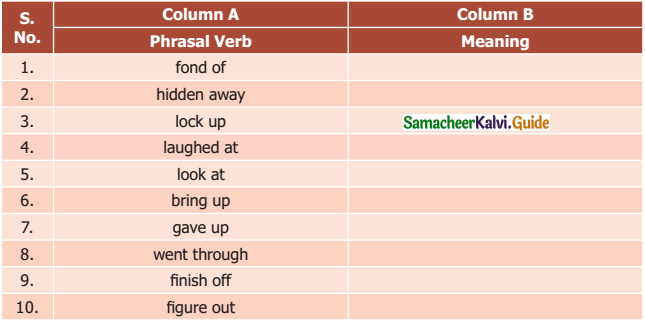
Answer:
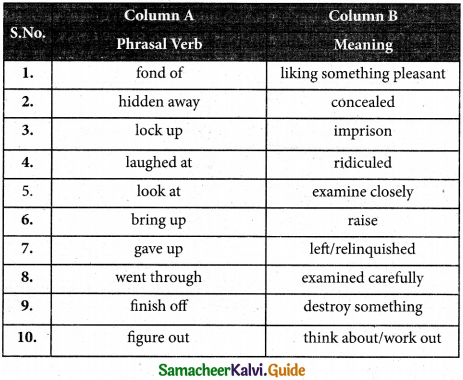
B. Can You do It?
- Talking about the abilities of your class members is a great way to review the use of the modal can.
- Work in pairs and discuss things a person might be able to do.
- Include things that some people can do and others cannot do, and make a list on the board.
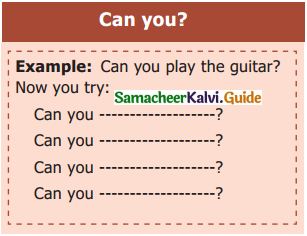
Answer:
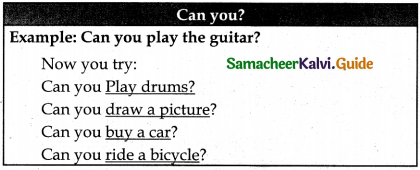
C. Do’s and Don’ts (Necessity, Obligation and Permission)
Choose the correct option:
- We use ……………. (should/must/ ought) when something is compulsory, obligatory and important.
- We use …………… (should/must/ought) when something is the right thing to do.
- We use …………… (should/must/ought) when something is suggested or recommended.
Answers:
- must
- should
- ought to
D. Complete the sentences with one of the modal verbs given below.

- Students ……………….. be quiet when they write the examination.
- You ……………… were a coat, it’s quite warm
- ………………. open the window? It is very hot in the room.
- I ……………….. go to school yesterday because I was ill.
- When she was eighteen, she run fast.
- You ……………. drive fast, it’s no safe.
- He is a famous cricketer. He …………….. bat well.
Answers:
- may
- shouldn’t
- could
- couldn’t
- could
- shouldn’t
- can
E. You are Andhav. While you were away on a holiday, your house was burgled. Use appropriate models and complete the letter to your friend telling him/her about it/
No. 36, Gandhi
Road Chennai – 45
04 August 2018
Dear Ramesh,
How are you? I feel sad to inform you that my house was burgled last week when I was on a holiday. Burglars (1) …………….. have known from the accumulated newspaper pile that I had gone away. When I came back last Sunday, I found the back-door lock broken. I (2) …………….. have forgotten to bolt the back-door from inside and they ………………. have entered through it. My room was ransacked. They took my laptop and other valuables. I (3) …………….. have deposited the jewellery in a bank locker to avoid this loss. I (4) ………………. have informed my neighbours about my week-long trip. Well, I have registered an FIR with the police. They are investigating the case. They have assured that I (5) ……………… get my jewels back. The Bulgars (6) ……………… be caught very soon. Convey my regards to all at home.
Your lovingly,
Aadhav
Answers:
- should
- should
- must
- should
- should
- must
F. Match the squares to form proper sentences.
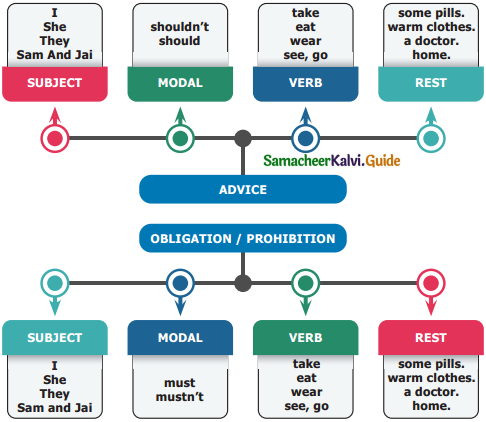
Answers:
- I/She should take some pills
- She/They shouldn’t wear warm clothes
- She/They shouldn’t go home
- Sam and Jai should see a doctor.
G. Fill in the blanks with appropriate modals.
(will / shall, would / should, can / could, may / might, ought to)
Milk is a nutritious food enriched with vitamins and proteins. We (1) ………………. take milk regularly so that we (2) ……………. not develop deficiencies in our body. Aged persons, children and patients (3) …………. take milk in sufficient quantities as it provides strength to their body. We (4) ……………. supplement it with fruits, vegetables, and pulses for proper growth of the body. But we (5) ………………. consume the milk of good quality. Otherwise it (6) ………….. cause harm to the body. We (7) ………………. be very careful while selecting our food items because there are chances that these (8) …………….. be adulterated. We (9) ………………. protect our health.
Answers:
- should
- shall
- can
- ought to
- should
- may
- should
- could
- should